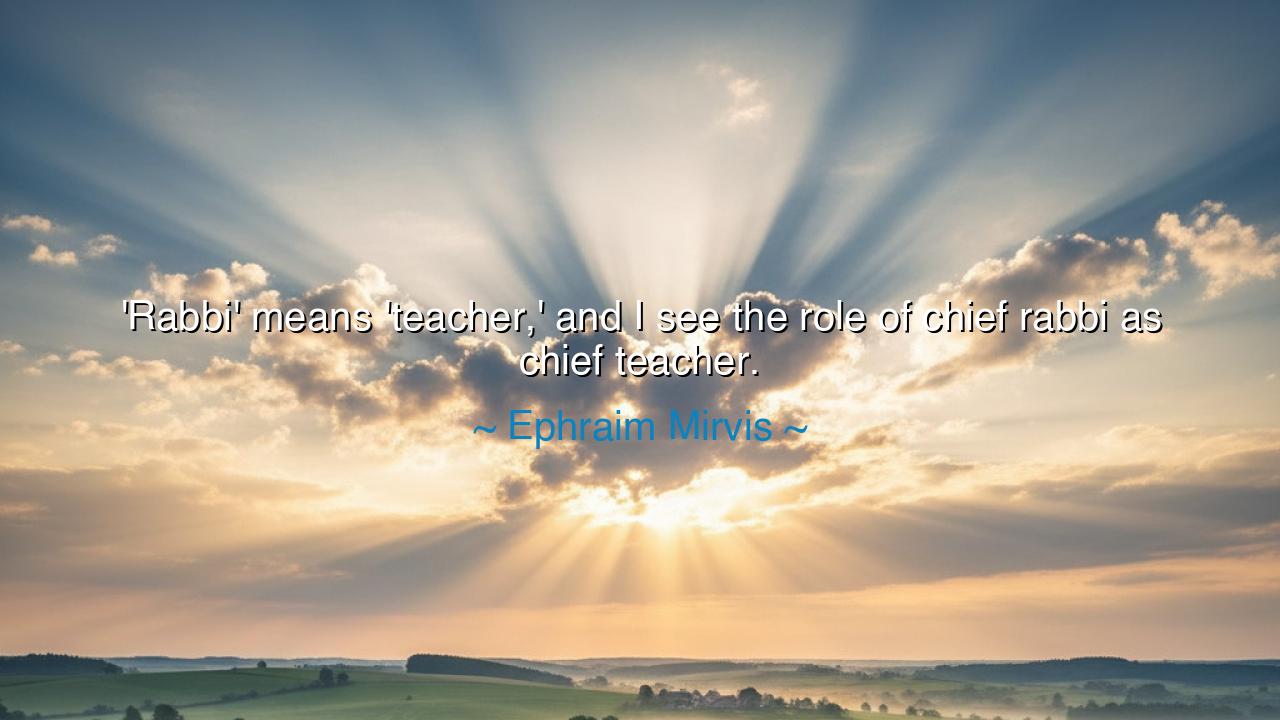
'Rabbi' means 'teacher,' and I see the role of chief rabbi as






Hearken, O seekers of wisdom, to the words of Ephraim Mirvis, who illuminates the sacred role of the rabbi, that ancient vessel of knowledge and guidance: “‘Rabbi’ means ‘teacher,’ and I see the role of chief rabbi as chief teacher.” In this simple declaration lies the weight of centuries, for the teacher is not merely a dispenser of knowledge, but a guardian of morality, a guide of souls, and a keeper of the flame of understanding. To hold the title of chief rabbi is to embrace the sacred duty of nurturing hearts and minds alike, to shepherd not only the intellect but the spirit of a people.
In the annals of history, the teacher has always held a place of reverence. The sages of Jerusalem, the philosophers of Athens, the masters of the East, all recognized that to instruct is to shape destinies. A rabbi is called not merely to instruct in ritual or law, but to inspire reflection, to awaken conscience, and to instill a living sense of ethics and devotion. The chief rabbi, then, becomes the compass by which a community navigates the turbulent seas of human experience, offering wisdom where confusion might reign, and stability where chaos threatens.
Consider the example of Hillel the Elder, whose teachings have endured across millennia. Though he lived long ago, his words continue to echo in the hearts of those who seek to live with compassion, justice, and humility. Hillel taught not only through sermons but through the embodiment of his principles, showing that the essence of teaching lies in living the truth one imparts. In this, he was a beacon, a chief teacher whose influence transcended his immediate circle, shaping generations yet unborn.
The essence of Mirvis’ insight is that leadership is inseparable from instruction. To govern, to guide, or to hold authority without the heart of a teacher is to wield power without illumination. The chief rabbi’s authority derives not from position alone, but from the ability to teach, to awaken minds, and to cultivate virtue. Knowledge is not static; it flows, it inspires, and it transforms. To be a teacher is to be a conduit of this sacred river, shaping not only understanding but character.
In our own lives, we are called to embrace the role of teacher in myriad ways. Each act of guidance, each example set, each patient explanation is a reflection of the sacred duty that Mirvis describes. Parents, mentors, friends, and leaders all carry the mantle of teaching when they impart wisdom, foster reflection, or illuminate the path for others. The true measure of influence is not wealth, fame, or power, but the capacity to educate, elevate, and inspire those around us.
History is replete with leaders who understood this principle. Consider Maimonides, whose writings on law, ethics, and philosophy continue to instruct countless generations. Though he was a physician, scholar, and thinker, he remained foremost a teacher, understanding that the preservation of wisdom depends on its transmission. The chief rabbi, in Mirvis’ conception, follows this sacred path: to lead through the art of teaching, shaping minds, nurturing souls, and cultivating a living tradition that endures through time.
Let us, then, take this teaching to heart. To assume authority is to assume responsibility; to lead is to teach. Let every word spoken with care, every act undertaken with guidance in mind, be a reflection of the teacher within. Let us strive to cultivate patience, clarity, and compassion, that our influence may elevate, inspire, and endure. In doing so, we honor the essence of the rabbi, the teacher, and participate in the timeless chain of wisdom that binds past, present, and future.
O children of the ages, hear this and act: whether in the sacred halls, the bustling marketplace, or the quiet corners of our homes, let us embrace the mantle of teacher. Let us guide, illuminate, and instruct, not for pride, but for the shaping of character and the nurturing of virtue. For in teaching, we preserve the flame of wisdom; in teaching, we shape the world; and in teaching, we honor the eternal calling that Mirvis so eloquently proclaims.
If you wish, I can also craft a practical guide on embodying the spirit of the teacher in daily life, inspired by the wisdom of the chief rabbi. Would you like me to do that?






AAdministratorAdministrator
Welcome, honored guests. Please leave a comment, we will respond soon